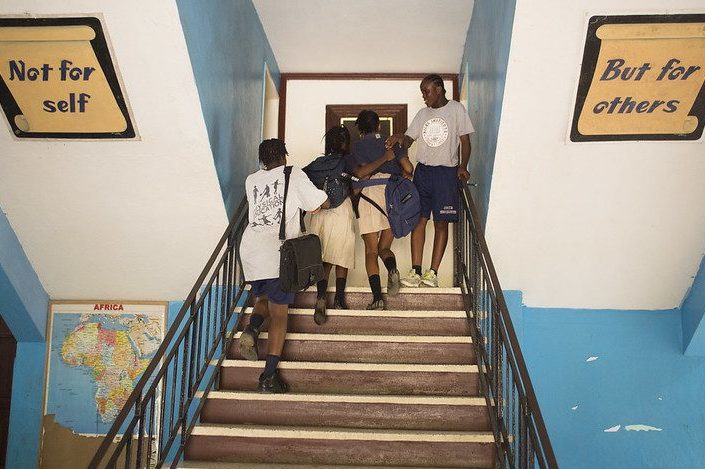NEWS
August 18, 2023

IN BRIEF
Liberia, situated on West Africa’s coast, claims the distinction of being Sub-Saharan Africa’s oldest republic. Established in 1821 by freed American slaves through the American Colonization Society, it became independent in 1847. For 102 years, from 1878 to 1980, Liberia was governed by the True Whig Party, operating under a single-party system. Unfortunately, this era was defined by underdevelopment, widespread corruption, and the mismanagement of precious natural resources. A significant turning point emerged on April 12, 1980, when the People’s Redemption Council (PRC), descendants of the military, orchestrated a brutal coup that thrust Liberia into an internal maelstrom. Tribal tensions [...]
SHARE
Liberia, situated on West Africa’s coast, claims the distinction of being Sub-Saharan Africa’s oldest republic. Established in 1821 by freed American slaves through the American Colonization Society, it became independent in 1847.
For 102 years, from 1878 to 1980, Liberia was governed by the True Whig Party, operating under a single-party system. Unfortunately, this era was defined by underdevelopment, widespread corruption, and the mismanagement of precious natural resources.
A significant turning point emerged on April 12, 1980, when the People’s Redemption Council (PRC), descendants of the military, orchestrated a brutal coup that thrust Liberia into an internal maelstrom. Tribal tensions escalated, especially between the Krahn and Dahn ethnic groups led by Master Sergeant Samuel K. Doe and General Thomas Quewonkpah, respectively. This internal strife ignited a broader tribal conflict that drew in other factions.
Following constitutional alterations by the PRC, Liberia held elections in 1986, with the National Democratic Party of Liberia (NDPL) winning an election marred by controversy. The short-lived peace was shattered on December 24, 1989, as the National Patriotic Front of Liberia (NPFL), led by Charles Taylor, unleashed a wave of brutality. This marked the onset of a harrowing 14-year period of successive civil wars (1989-2003), claiming over 250,000 lives and including attacks such as the St. Peter’s Lutheran Church and Duport Road Massacres.
Liberia’s descent into war eventually gave way to a glimmer of hope on August 17, 2003, when Liberians gathered in Accra to sign the Accra Peace Agreement. This historic event united deadly war factions, permanent Liberian residents, and international partners, collectively rejecting further self-destruction. The accord centered on Disarmament, Demobilization, and Reintegration (DDR) efforts and the creation of the Truth and Reconciliation Commission (TRC). Guided by the United Nations Mission in Liberia, the DDR process demobilized over 100,000 ex-combatants and recovered about 28,000 firearms. Survivors and perpetrators shared their experiences with the TRC, culminating in a recommendation for a War and Economic Crimes Court.
In the country’s first post-war elections, Africa’s first female president, Ellen Johnson Sirleaf, rose into power for a 12-year tenure. While her administration established accountability institutions such as the Liberia Anti-Corruption Commission (LACC) and Governance Commission (GC), these efforts were hampered by limited funding. Notably, the recommendations of the TRC, including the creation of a War and Economic Crimes Court, remained unfulfilled.
January 2018 marked a peaceful transition after Liberia’s third post-war Presidential and General Elections in 2017. The major opposition leader, former footballer and Peace Ambassador Mr. George M. Weah, took office, replacing the former ruling Unity Party (UP) led by Ambassador Joseph Nyema Boakai.
However, Liberia’s journey toward reconciliation remains fraught with challenges. The scars of civil war and the devastating 2014 Ebola outbreak persist. Former President Sirleaf’s final State of the Nation Address acknowledged her administration’s shortcomings in reconciling the nation and fighting corruption. Similarly, President Weah’s administration shows limited signs of reconciliation or combating corruption, despite facing sanctions from the US Treasury Department.
Approaching the 20th anniversary of peace on August 17, 2023, Liberia stands at a crossroads, balancing the fragility of unity and the promise of reconciliation. To move forward, Liberia must prioritize the implementation of the TRC’s recommendations, including the establishment of a War and Economic Crimes Court, and the creation of a National Memorial for the war. Renewed efforts toward national cohesion and human capital development will offer hope for a future that eclipses past shadows.
In conclusion, Liberia’s journey toward lasting peace highlights resilience, shared lessons from history, and a deep aspiration for a united future.
